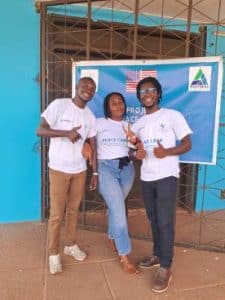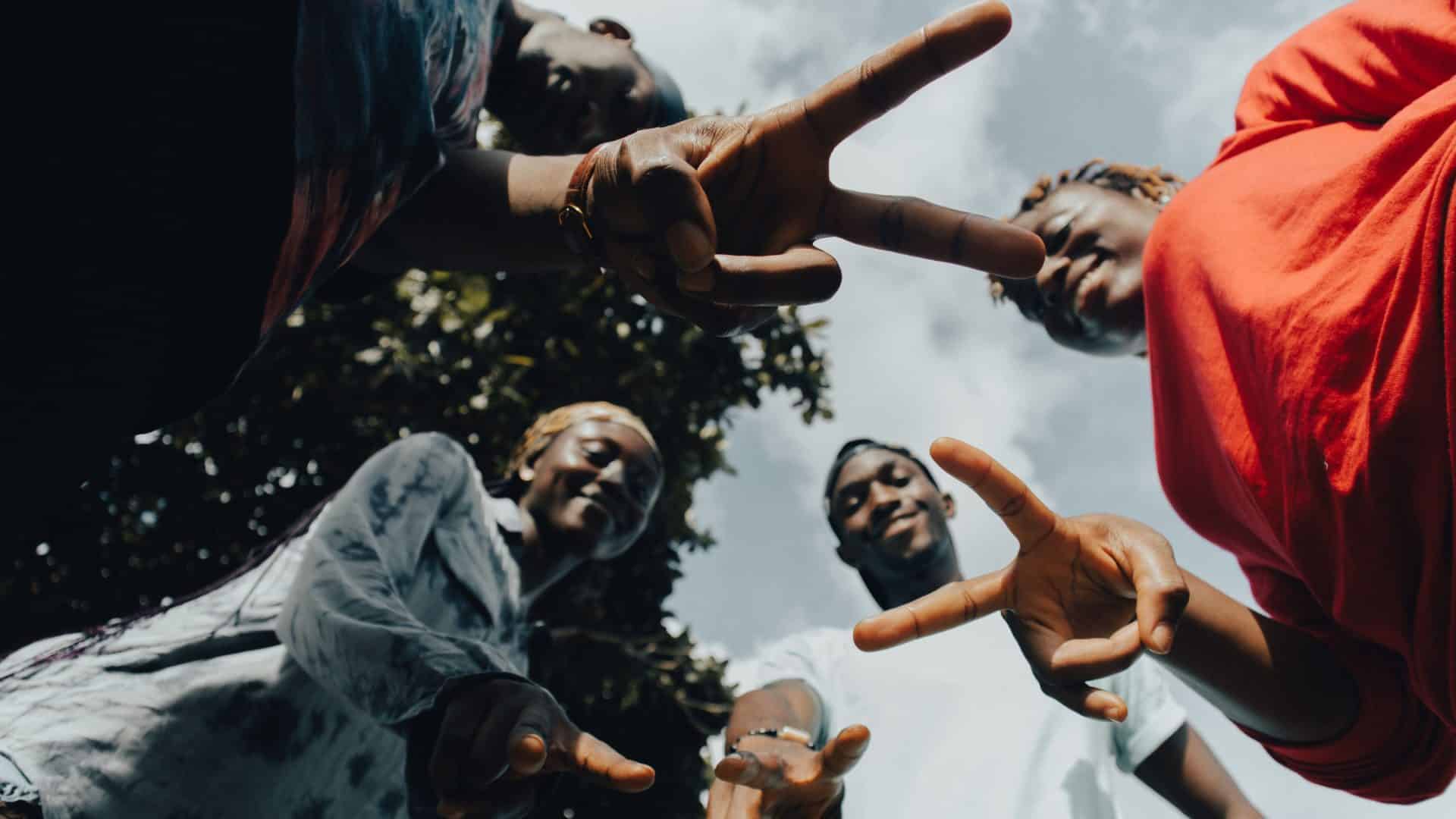From Conflict to Catalyst: Young West Africans Re-imagining Peace
“For most youth, the idea of investing time and energy in long-term sustainability efforts such as education, or peacebuilding seems irrational, if your life is being threatened on a daily basis.” – PEACE-WAY Fellow, Ghana, Alexander
Across West Africa, communities like Bawku in Ghana, and Man and Danané in Côte d’Ivoire continue to grapple with the legacies of decolonization—land disputes, ethnic tensions, and cross-border dynamics—now intensified by the spillover of regional instability. Military coups in neighboring Burkina Faso have fueled refugee flows and heightened the threat of violent extremism, placing young people at a crossroads: the harsh realities of economic exclusion versus the economic pull of violent extremist assimilation.
PartnersGlobal (Partners) and the West African Network for Peacebuilding (WANEP) seek to shift this narrative by equipping youth with the tools to lead change in their communities. Through the Peacebuilding Education and Capacity Enhancement for West African Youth (PEACE-WAY) initiative, Partners and WANEP support young peacebuilders to engage their peers, amplify their perspectives, and bring their lived experiences into the broader pursuit of peace. This article highlights the grassroots efforts of Alexander, Memunatu, Elisha, Fai, Leticia, and Kade, who have each designed and implemented local initiatives in response to the conflicts shaping their communities.
Alexander, Memunatu, and Elisha
 For PEACE-WAY fellows Alexander, Memunatu, and Elisha, who spent their formative years in the Bawku Municipal district, Bawku is home. Although Alexander, Memunatu, and Elisha met through the PEACE-WAY Program, each had already established themselves as committed community peace advocates. As active contributors to WANEP’s early warning program, they have been supporting national strategies to monitor and report on potential conflict triggers within their communities for the past year. Deeply familiar with the community’s challenges, their dedication to peacebuilding is rooted in personal experience—shaped by the challenges they faced growing up in communities highly vulnerable to protracted conflict. It is this lived reality that fuels their drive to foster resilience, growth, and lasting change among youth within their communities.
For PEACE-WAY fellows Alexander, Memunatu, and Elisha, who spent their formative years in the Bawku Municipal district, Bawku is home. Although Alexander, Memunatu, and Elisha met through the PEACE-WAY Program, each had already established themselves as committed community peace advocates. As active contributors to WANEP’s early warning program, they have been supporting national strategies to monitor and report on potential conflict triggers within their communities for the past year. Deeply familiar with the community’s challenges, their dedication to peacebuilding is rooted in personal experience—shaped by the challenges they faced growing up in communities highly vulnerable to protracted conflict. It is this lived reality that fuels their drive to foster resilience, growth, and lasting change among youth within their communities.
“From a very young age, I witnessed the impact that division and violent conflict can have on local populations. The ways in which these divisions have affected my family, relationships, and education, still bring up strong emotions in me to this day.” – Ghana PEACE-WAY Fellow Memunatu.
These three young professionals utilized PEACE-WAY grant funding to design a youth-focused initiative to foster dialogue and reflection among local community stakeholders in Bawku on the increasing threat of violent extremism and the role of youth in both fostering peace and preventing conflicts within the community.
With support from PEACE-WAY’s small grants mechanism, the team launched a project aimed at empowering youth to recognize their agency in preventing conflict and promoting peace withing Bawky. Central to the initiative was the collaborative production and public screening of a docu-drama that explored the realities of youth recruitment into violent extremist groups and highlighted the positive role young people can play in countering such threats. The project specifically addressed the socio-economic challenges facing youth in this rural, predominantly agrarian district—where limited access to education and economic opportunity increases vulnerability to succumb to extremist ideologies. Ultimately, the initiative sought to build youth resilience by equipping them with the awareness, skills, and confidence needed to resist recruitment and contribute to lasting peace.
The film was produced in two communities within the Bawku district, engaging over sixty youth between the ages of 15 and 25. After production, the docu-drama was screened in both communities, drawing diverse audiences that included young people, traditional leaders, displaced families, and local residents. Each screening was followed by a community forum featuring 15 local leaders—representing religious groups, NGOs, village elders, youth, and chiefs—who participated in intergenerational, candid discussions on the role of youth in peacebuilding and conflict resolution strategies.
The docu-drama approach not only served as an innovative medium for sharing critical messages but also enhanced the Fellows’ credibility as peace advocates within their communities. As a result, more community members have begun approaching them to report unusual activities or to seek guidance on managing tensions before they escalate. This growing trust has inadvertently strengthened the Fellows’ effectiveness in fulfilling their responsibilities as early warning monitors for WANEP.
Man & Danané, Cote d’Ivoire
PEACE-WAY Fellows Kone, Ange, and Fai used PEACE-WAY funding to establish a PEACE-CAMP—a youth-focused initiative designed to strengthen young people’s agency in conflict resolution and prevention within their communities.
Much like their Ghanaian counterparts, the Fellows have been shaped by the enduring impact of conflict from an early age—some of their earliest memories marked by jihadist raids on their neighborhoods. In explaining their motivation for launching the camp, the team pointed to the glaring absence of youth participation in regional peace- and decision-making processes, despite the reality that youth—particularly those between the ages of 26 and 31—are often among the most active participants in the conflicts themselves.
“More often than not—despite youth being the predominant actors in the violence occurring in our region—intergenerational dialogue between local leaders and youth is not a strategy commonly utilized in local peace processes.”
— Fai Martial, PEACE-WAY Fellow, Côte d’Ivoire
With support from PEACE-WAY, these three young professionals found both the tools and the platform to educate, mobilize, and to empower young people in the communities of Man and Danané. Their initiative aimed to amplify youth leadership in fostering peace and countering violent extremism by training 25 emerging community leaders on the drivers and consequences of violent extremism, while equipping them with foundational knowledge in peacebuilding, resilience, and community-based conflict prevention.
The program also engaged institutional actors and civil society representatives through structured focus groups that evaluated youth civic participation and co-developed actionable strategies for youth-led conflict prevention. A strong emphasis was placed on inclusive engagement, ensuring gender-balanced representation and deliberately addressing the lack of dialogue between youth and traditional community leaders.
Key activities included dialogue sessions that created space for reflection and intergenerational exchange, as well as training in public awareness campaigning to effectively communicate the dangers of violent extremism.
Following the program’s conclusion, several PEACE-CAMP participants expressed deep gratitude for the knowledge and networks gained. Some have already launched their own awareness campaigns and youth-led initiatives in their communities—an inspiring testament to the ripple effect that Kone, Ange, and Fai’s leadership has sparked.
Conclusion
The journeys of these PEACE-WAY Fellows show that when young people are entrusted with the tools, space, and platforms to lead, they emerge as powerful catalysts for change. Today, Kone, Ange, and Fai are mobilizing youth in conflict prevention through advocacy, dialogue, and community engagement. With Côte d’Ivoire’s presidential election approaching in October, they have taken the lead in facilitating both online and in-person dialogues with youth and community leaders on strategies to ensure safe, secure, and peaceful elections. Meanwhile, Alexander, Memunatu, and Elisha continue to champion sustainable peace in their own contexts and remain active contributors to WANEP’s early warning system, helping to prevent local tensions from escalating into violence.
In regions where instability and extremism threaten to define yet another generation, these young leaders are reshaping the narrative. By building spaces for dialogue, championing grassroots action, and reclaiming their role in local peace processes, they are proving that peace is not only possible, but already underway. What remains is the continued investment in their vision, the scaling of their strategies, and the recognition that youth are not just beneficiaries of peace but builders of it.
